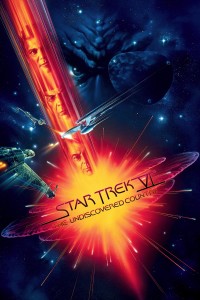I ranked my favorite Star Trek movies but realized I hadn’t watched a lot of them for a long time. I am watching them again in chronological order and sharing some of my thoughts after a fresh viewing. Maybe some of the movies will have a chance to move up my list after watching them again.
Last week I watched Star Trek V: The Final Frontier. This week I watched Star Trek VI: The Undiscovered Country.
Man, I really do love Star Trek VI. It’s just a great Star Trek movie and a perfect swan song for the Enterprise’s original crew. After watching it again I may have to rethink its original position as my fifth favorite Star Trek movie.
I love that it lays the groundwork for peace between the Federation and the Klingon Empire.
I love the pacing of the movie, even the little side trip to Rura Penthe.
I love all of the Shakespeare.
I love seeing the NCC-1701’s crew slide so effortlessly into their characters and the relationships that come from them.
I love Star Trek VI: The Undiscovered Country. Here are some thoughts I had while watching the movie.
Forgiveness
I’m pretty sure I saw Star Trek VI before I saw Star Trek III. I didn’t know that Captain Kirk had a son, much less that he was murdered by the Klingons. In a log that comes back to haunt him, Kirk says, “I’ve never been able to forgive them for the death of my boy.” Forgiveness is an essential part of living the lives for which we were created. Jesus tells us to forgive others as he has forgiven us and to forgive others as many times as is necessary. Even Kirk wasn’t able to fully embrace Gorkon’s undiscovered country without forgiving the Klingons and moving past the death of his son. If we want to experience the full life for which we were created then we need to work through the process of forgiveness. Forgiveness brings us freedom from the burden of carrying a grudge and allows us to experience our own undiscovered country.
Peace
“Peace is worth a few personal risks.”
I love Kirk’s transformation in this movie. It’s easy to think that he would have sided with Admiral Cartwright, General Chang and Lieutenant Valeris. Kirk’s angry conversation with Spock and his admittance that he can’t forgive the Klingons shows how difficult peace can be. However, Kirk chooses to look beyond his own pain and personal prejudices to see the universe as it could be. Kirk definitely faced some actual risks to his own life, but he also had to face the risks of giving up old perspectives and embracing a future he wasn’t sure had a place for him. Shalom is the peace of the Bible and it means much more than the absence of conflict. Shalom represents the idea of wholeness and that is definitely worth any number of risks. Seeking God’s wholeness in our lives and the world around us will definitely cost us something, but will also gain us something of infinitely more value.
The End
My appreciation for Captain Kirk and his crew has grown as I’ve spent more time watching the original series. The crew that sets course for the second star to the right is a far cry from that of “The City on the Edge of Forever” and “The Menagerie.” However, one of my favorite parts about watching the first six Star Trek movies has been the growth and development of the characters and their relationships. When I first watched the original crew’s movies, it was like seeing the last few stories built on a skyscraper. Sure, they were all right, but they mean a lot more to me now that I’ve seen some of the foundation. Star Trek today is much different than it was in 1966 or even 1991. However, no matter how many new stories are added, they’ll always be built upon the foundation laid by Kirk, Spock, McCoy, Scott, Sulu, Uhura and Chekov.
I really didn’t think I would like The Undiscovered Country as much as I did. It’s one of the movies that I’ve seen the most. Yet, watching it again, made me realize how much I really do enjoy it. It definitely has a chance of moving up my list, perhaps even cracking the top three.
What are your thoughts about Star Trek VI: The Undiscovered Country?


0 comment